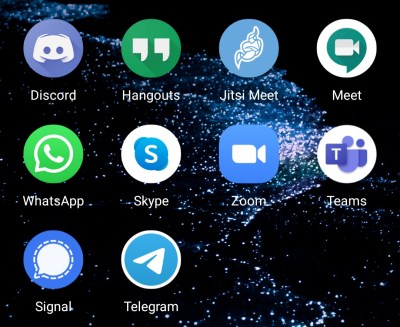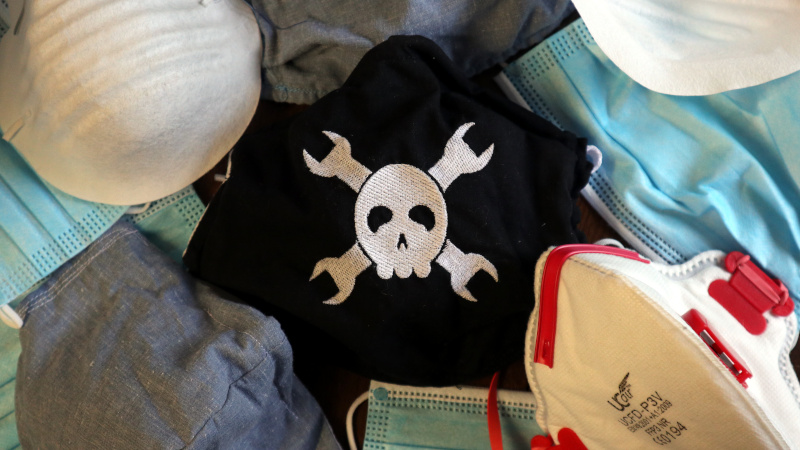As we’ve looked at the subject of face masks in the first two parts of this series, our emphasis has been on a physical step to aid your chances of making it through the COVID-19 pandemic in one piece. But given that the upheaval caused by all the social changes enacted to protect the population are likely to leave an indelible mark on those who live through them, there are significant aspects of surviving all this that go beyond the physical.
This will be a once-in-a-lifetime event for many people, a significant number will find it traumatic in some way, and for many of those people there will be an immediate and then ongoing effect on mental health. If anyone is in doubt as to from what position this is coming, I count myself among that number.
The Pressure Of A Once In A Lifetime Event

Different countries have placed their own public health restrictions on their populations, but it’s likely that many of you are in some form of lockdown situation, with social or communal activities and locations closed or curtailed, going out restricted, and with all around you in the same situation. A perfect storm of having social outlets removed while simultaneously being stuck at home perhaps with family or housemates you’d prefer not to spend too much time with is not ideal. Add to that the multiple stresses from the pandemic itself as well as other news stories from our turbulent world, and it’s hardly a surprising that it’s taking a toll.

In my case, I found myself abruptly deprived of my main social outlets, as my hackerspace closed for the duration and my group of friends could no longer hang out. Living in the depths of the countryside as I do can be great in normal times, but being forbidden to leave my little part of it and seeing nobody else at all except my family members for a couple of months has given me a rough ride.
At first I dove into online meetings, and quickly amassed a pile of new apps for different services on my phone. But then the sheer number of social groups came to take up most of my evenings, I found I had little left to say, and gained a new source of stress lest I’d said the wrong thing, or not supported someone adequately, or looked like a fool. I’ve had an up-and-down existence these last couple of months, and the same worries can be found in whether I can find enough Hackaday stories to make up a month, or whether I taxed my car on time.
It’s OK, This Isn’t Normal
It’s crazy, finding oneself approaching burn-out when one should be having an easier time of it due to less of life’s normal stresses. But I suspect I’m not alone in this. I think my mistake was to expect that in extraordinary times I could continue on as normal, because while the world around us has gone a little crazy it’s all the same in my little office with its gently humming PC and oversized clacky keyboard.

If I have a takeaway from all this, it’s that what I needed to do was to recognise that this isn’t normal. It’s unreasonable to expect to be able to do things as before, even to be able to do more than before. I wasn’t having endless Jitsi and Zoom meetings before all this, in fact I didn’t even have either service. So why was I suddenly deeming myself able to be the life and soul of the party 24-7, and then chastising myself for being unable to live up to it?
And why was I surprised that feeding the ever-hungry maw of a continuous daily publication such as Hackaday was feeling so daunting? Few of us can be superhuman at the best of times, so perhaps we should all recognise that it’s OK to back off a little when things become too much. I found that backing away from the interactions helped me a load, and spreading out my Hackaday work also made it less intimidating.

Recognising my limits and cutting back on the things that were bringing me down may have restored some balance, but I am still cut off from my peers and in uncomfortable proximity to my family. In this I am indebted to a small network of friends with whom I’ve been in regular phone contact. Not Jitsi or Zoom, good old-fashioned phone. We talk, we help, we keep each other sane. I hope I have been as much help to them in this as they have to me.
Finally, The Rest Of You Have A Part To Play Too
This has been my attempt to make sense of the pandemic as a mental health event, drawing on my own experiences. I’m not out of the wood yet, but I hope if you find yourself in a similar state then some of my coping strategies may be of help to you.
There is another side to this though, and it lies with those of you who aren’t suffering particularly from all this. Wow, I envy you! Some of you though maybe won’t realise that not everyone is like you, so now’s the time to consider this, and think before you speak and act around other people during this difficult time. If our community has an ugly side at times it can be that its culture can be unforgiving, and sometimes what may seem like a throwaway comment on a forum or social media to you could have a crushing effect on someone else. Part of us all getting through is making much more of an effort to be nice to one another, and thereby making ourselves a little better. Let’s do that.
Take care, and think about what you post, and if you see someone you know abruptly disappear, check up on them. Together, we will get through all this.
















Hang in there. I enjoy what you do.
Thanks :)
Another aspect of this: the expectation that we use our knowledge to help fight, and what that brings about. A lot of people picked up extra projects to help healthcare workers, others started working on new projects to help fight the virus. At this point it’s a bit overwhelming, there are lots of duplicate efforts, and everyone is trying to drag our attention every which way. All relatives are pressuring me to print neck savers because they saw it on FB, despite me knowing there are people with much better tuned setups cranking these out.
I’m helping with electronics on a ventilator project, but we’re competing with both open source options and professional options (i.e. JPL) and it’s somewhat disheartening knowing that I don’t have the time and resources to compete. Being able to know your limits and not feel guilty by not working towards a solution is a hard thing to manage. But at the same time, how we get through this is recognizing and managing burnout that comes from these extra efforts, and that what was a hobby is now a job that has ‘the fate of the world’ resting on a few extra boards assembled, or a few extra neck savers.
I’m glad I’m able to help, and I don’t want the recognition that comes from helping, I don’t care about that. What I do want is for people to have realistic expectations of what we can accomplish, and that not everyone needs to put their own effort together to fight this, and to normalize taking a step back if you’re not in a state to help with everything going on.
I certainly know people burning out from the PPE manufacturing effort.
Yeah, our little gang at Southampton Makerspace bashed out around 6000 face shields in the early part of the crisis, and we were glad when demand dropped so we could have a rest. It was getting awfully exhausting.
That’s an example of why I believe, many here in the US, aren’t up for a WW II level crisis. Sure hackerpace production isn’t income earning production like war production jobs are IMO the grind of unpaid production, has to be better than sitting at home twiddling your thumb, why watching equally mind numbing TV.
I just started a remote internship and found this article to be very helpful. Great read and much needed perspective on this pandemic.
I’m glad you found it of help. And good luck.
No man/person is an island – it may seem you are totally alone, but remember that pandemics are like the tide – right now it is high, and you may seem cut off, but once it recedes you will once again find that there was just low lying ground between you and your friends/acquaintances.
It is more important that you practice moderation in all things [including moderation], and remember that change in your life is what gives it texture.
speak for yourself.
Smoking crack is a little fun sport for me… In this boring times.
Remember: If you think there is no one who cares if you are alive or not, try missing a mortgage payment.
What is the big deal? Grow up. Be tough. Embrace change. This too will pass.
This can be viewed as an opportunity, not a problem
Don’t sweat the small stuff, this is small stuff.
Bombs aren’t falling, nobody is kicking my doors in.’
My friends and family aren’t in prison being tortured.
I see a lot of people throwing around a ton of therapy-talk and categorizing everything that happens within their lives as “trauma” these days. I’ve read some pretty credible opinions saying that this actually doesn’t protect your feelings and mental health, but instead makes people more brittle and vulnerable. It causes anxiety instead of alleviating it.
To a certain extent, it’s good to be in touch with ones feelings and be honest with oneself when there’s a problem. But constantly hyper-focusing on it and framing everything that happens as dreadful trauma is a form of self-flagellation and it’s not actually good for people. It’s like people with anger problems punching things to “blow off steam”—that doesn’t actually provide an outlet to anger and reduce anger, it just reinforces a pattern of responding to stress with violence. Getting into big obsessive episodes about stress and anxiety and trauma don’t let out those feelings; they reinforce a person’s dependence on those feelings and start to cement those feelings as a whole personal identity. Once you’ve reached that point, it’s nearly impossible to escape.
I wish more therapists would see their help as a short-term intervention that patients can graduate from and move on without instead of something that goes on for years and years even for people who don’t have serious mental problems or exceptionally horrible life events. Like people shouldn’t go to therapy for five years because their parents were kind of distant but otherwise fine and supportive. That’s a cult. That’s a scam. Be wary of those therapists.
Hey there from Argentina. Quarantine here was going to be 15, possibly extended for another 15. 90 days later I started to feel it. Thing is Buenos Aires is one of the most affected areas in Argentina and quarantine is not going to get loose over here soon. I always be kind of a lonely person but now I miss have a beer with my friends. Yet, I’m consider myself a very lucky one. I’m leaving with my girlfriend (since a couple of years now) and connivance with her is really easy. We both know that there are some things we need to do every day, like cook, do the dishes, take out the garbage or take care of the cat poop. If one of us do it, then the other one doesn’t need to. Damn, we don’t even agree explicitly about this and is a pleasure to me to ease some of her doings. Not everything is pink and we try to keep calm and not to confront, but sometimes is not possible. The flat is really small yet we have a small patio. I’m going to share with you all some of the things that help me to stay sane. This may not going to help everyone, but is not going to hurt anyone either.
* Keep a routine. I normally try to get up early, do the dishes from the night before while ready my breakfast and then use most of the morning to work in my PhD. Routine not necessarily needs to be the same for every day, but you must agree with you co-living partners the day before the plans for the next day. I.e.: if I’m having a meeting near noon, I will not be able to cook, so usually my girlfriend do it or I made enough the night before so we can have a quick meal without to much doing. I didn’t need to write it down, but if it helps, do it.
* If you burned out of your work, use the time for something else. Must be something completely different and easy on the thinking. Help to do some cleaning, play some instrument (with headphones so you don’t perturbate others), some exercise.
* Do some gardening. You don’t need a huge space. It is possible to grow tomatoes in a pot, but have a peppermint in a can over the window can help too. We don’t have a garden, yet we manage to grow some aromatic plants to sasonate our meals in a couple of pots. It’s really reassuring to us to take care of our plants and we dedicate some time every day to take out bad weeds. But most important, you see them change everyday and suddenly, the days are not the same anymore.
* Stay in touch with your loved ones by phone. Totally agree that conventional phones are the best way to do it. This will not only help you, but maybe could be life changing for the person in the other end of the line.
* Use your extra time to start another project related with something you like. Most of us used to be on the public transport for an hour till you are at the lab, or office or workplace. So you have at least two extra hours per day, 10 hours extra per week. That’s a gift you should not turn down. Make that time worth it.
And yes, it’s a team work. To live with someone else, is. So try to play nice with your team. I told you, I’m one of the lucky ones who could choose with whom to play with, but if it’s not your case, take advantage of the opportunity and change it. Maybe it’s time to move to your own flat.
Stay safe.
Strangely enough, gardening is one of the things I’m doing. Growing vegetables. :)
My gunny used to say “Life sucks, then you die.”
‘Pandemics’ are common. Has happened before in recent times (1918, 1957, 1969, 2009), with more to come. The only difference being the knowledge of and the response to real-time media technology.
Relax people. We are all going to die eventually.
you forgot aids.
anyone sufficiently crazy enough probably doesn’t notice any difference. practiced social distancing before it was cool and all. and they keep giving me free money i dont need. the pantry is full, the computer upgraded, plenty of tp, and i still have money. fortunately one can use the surplus to practice substance abuse thanks to legalization.
What is ‘tp’?
Toilet paper?
Yeah, I prefer to call it “Right Distancing”
This is like a light training for a trip to the Mars colony. If you can’t cut it now, might as well forget about going to space.
You’ll have limited contact with people and you won’t be able to go to a hair salon or do windows shopping. Breathing is harder etc. Every mistakes out there can kill you and only good discipline can help you survive.
I live alone so I’m finding it pretty hard. I don’t think even a Mars mission would leave me alone for 3 months.
From a mental health perspective the best solution is to follow the Swedish model of handling the virus. Preserve civil liberties, don’t cause economic carnage, and give the people a sense of active purpose not passive retreat by making it clear that following good hygiene practices while gong about your normal day is how you can help stop the virus while keeping the world going.
The jury is still out on this one. Compared to the rest of Europe, Sweden got the virus later, and got hit less severely due to their low population density and distance from the European epicenter: Northern Italy.
But Sweden is still getting an increasing number of COVID cases per day, while the rest of Europe is essentially “recovered” to the extent that businesses, schools, restaurants, and libraries are open again. (Still, with distance/mask requirements.) Mass gatherings are still off the menu. The number of new cases per day in all of these countries is now negligible.
Even the UK, which started it’s control efforts painfully late, is seeing a relatively speedy reduction in the number of new daily cases because they’ve (finally) taken the quarantining seriously.
Sweden, in contrast, already has a similar number of fatalities / capita to France or Italy, and significantly more than Germany, while the number of cases grows at an increasing rate. Just from that alone, you would expect them to have at least double the number of fatalities that they have currently before this is all over. This makes the Swedish model look like a horrible mistake from a healthcare perspective, and certainly not a model that you would want to export to a country with more than 10M people, less wealth, or without widespread social and health insurance.
Time will tell if they took the “right” path, weighing economic and social disruptions in. But from a public health perspective, it already looks like a failure that’s slowly getting worse.
And there’s evidence CV19 was in the UK before Christmas, which means the U.K. is doing pretty damn well with that taken into account.
Do you have a source for CV19 being in the UK before Christmas? The only reference I could see along these lines was debunking a myth.
The Swedes aren’t out of the wood yet, they’ve by no means got it under control.
If your only source of information about what is happening in Sweden is the March copy of the National Review still sitting on the coffee table, it is probably time to catch up.
Dr. Anders Tegnell, Sweden’s state epidemiologist in charge of this policy, now says he would not repeat his mistake: https://www.bbc.com/news/world-europe-52903717
“If we were to encounter the same disease again, knowing exactly what we know about it today, I think we would settle on doing something in between what Sweden did and what the rest of the world has done.”
Yesterday, he said: “…the trends in immunity have been surprisingly slow…it’s difficult to explain why this is so.”
https://fortune.com/2020/06/17/sweden-herd-immunity-surprisingly-slow/
In terms of economic impact, Sweden is not doing better than its most similar neighbors. https://oecd.github.io/EO-Outlook_chart_3/ Click the OECD button and you will see that not only is Sweden’s death rate higher than Norway and Denmark, but the economic impact will be worse.
Unemployment predictions are high and getting worse:
https://www.reuters.com/article/sweden-unemployment/update-1-swedish-labour-board-says-joblessness-to-peak-at-114-in-2021-idUSL8N2DT1S3
The policy has become a political scandal and even the Financial Times has deemed it “A very Swedish kind of failure.” My apologies to the good people of Sweden who are suffering under Tegnell’s arrogant experiment.
Graphs on wikipedia are presently showing a spike in cases in Sweden, which wikipedia explains as due to an recent increase in testing capacity, but ICU hospitalisations have been dropping since early april and are at under 10 per day now, and deaths have been dropping since mid april to also less than 10 per day.
https://en.wikipedia.org/wiki/COVID-19_pandemic_in_Sweden#Statistics accessed at 18:37 on 18/06/2020 London Time
Looking at ICU hospitalizations is certainly an interesting metric, and it’s a good sign that’s going down.
However, if you look at the number of new cases, it’s going in the other direction, but as you point out, it looks like it’s muddied by an increased testing procedure that started in June. It might`be a wash.
The mortality statistics, according to the Wikipedia writeup, are delayed by up to a week. So if you look at June 10th, for instance, you see 30 deaths and 10 ICU hospitalizations, whereas the number of deaths seems to drop off significantly as you get closer to the time the data was updated, June 17th. Be a little bit careful in interpreting the freshest mortality data.
But again, Sweden is kind of an anomaly. With lots of resources, a strong public health system, and only 10 M inhabitants, it’s hard to find a comparable. But if you look at, for instance, Portugal, which also has 10 M population, you see 5,000 dead in Sweden and 1,500 in Portugal — a slightly poorer country.
Denmark is very similar economically, but has half the population of Sweden. However, they only have 600 fatalities.
I think that this will be better analyzed in the future, but Sweden’s path does not look good, and certainly isn’t a model to transfer to bigger or poorer countries.
Nailed it. Thank you so much, Jenny. I enjoy all your articles, but this one really resonates. Hang in there, your readers love you.
Thanks, I appreciate it. And you take care of yourself in this difficult time.
Mental Health is always a difficult subject because of the social stigma.
I am a regular poster on HAD but today I have change my screen name for the above reason.
I have diagnoses of Post Traumatic Stress Disorder, Major Depressive Disorder and Anxiety long before the CONVID 19.
Rather than 1.5m social distancing I tend to keep a distance of a couple of hundred kilometers. I live in the bush most of the time. In fact I was blissfully unaware of the global pandemic for several months.
As you may guess from the name PTSD, it’s a condition related to stress and trauma.
I am noticing behavioral changes in many of the people around me, some of whom are complete strangers. I am seeing irritability and anger expressed more frequently. In my country there has been an increase in domestic violence and a drop in other crimes.
No doubt some people will think of me as week. The sad part about this is that these very same people are less inclined to seek support when they need it and consequently they can have poorer outcomes that not only effect themselves but also pothers around them.
Anyway, if you need help then there is plenty of professional support available. If not talk to a friend or relative who is non-judgmental and a good listener.
Here are some of the things that help me and my non-professional understanding of why they help.
Let’s start with some of the “whys”.
Humans (and animals) have a limited cognitive ability. If you have studied safety then you will know that most accidents occur when a human is under high cognitive loads.
Stress of any form will reduce cognitive abilities. Generally people are completely unaware of how dramatic this can be because we live most of our daily hours doing things that are routine and because it is routine we have a very low cognitive load.
When our routine is completely changes we are then forced to think a lot more about what we are doing and that’s when people notice a difference. The frustrating experience of having to put more cognitive effort into what we expect to be a menial task leaves us more stressed. This in turn further reduces cognitive ability.
So you have to monitor your stress levels and let things go and try to relax when you start experiencing this or things will get progressively worse. It’s definitely not good to push ahead when you are experiencing some difficulty.
Also, there is a heightened risk of Anxiety and Depression.
There are some things that link all three.
To recharge our cognitive ability and feel normal we need to maintain a good sleep routine.
Science is now showing that stress and depression are strongly link to sleep quality (not quantity). The same is true to a lesser degree for anxiety.
We have a natural circadian rhythm. The things that help maintain this are things like looking into areas light with sunlight first thing in the morning. You can choose lighting of a lower color temperature later in the evening approaching bed time.
Regular (but not strenuous) exercise helps. No exercise is bad but very little exercise is good. I simple walk around the house a couple of times a day can be very beneficial.
Also getting the morning sun on your skin helps, as silly as that sounds.
Regular meal times helps to but the above are far more important.
And if you have the head space reach out to others. Phone calls are good when you have time. You’ll be doing them a favor to.
I think those of us who have had to cope with mental health issues long term may be better able to deal with it. But that’s in a “Know what to expect” sense, not a “Makes it easier” one.
I did the same cycle. Relieved that I didn’t have to meet people, got bored/lonely and got on social media, overwhelmed by online social interaction, then stressed and anxious. Getting off those sites and hanging out with a few close friends made things better.
I’m normally stoic and independent so I didn’t expect any trouble with quarantine. But unfortunately my brain is powered by chemical reactions and requires basic maintenance.
this should’ve been a new comment, not a reply
My mental health is better than ever, no unnecessary contact with people draining your energy.
No handshaking, hugging, kissing and other unhygienic practices.
Finally it is clear that all those management layers and meetings are pointless and unneeded.
I have a few good friends that I meet every 3 or 4 months or so, now I call them so no change in that aspect.
I have the time of my life and more energy than ever, hope it lasts a few more months.
It is interesting to observe the effects across the many people I know. Each is responding differently. Some are thriving, some are panicking.
As someone who was either working from home while my spouse was at her office or out visiting remote offices and customers at least once or twice a month, I find it very weird, and not consciously stressful, but I also catch myself with an increasingly short fuse when dealing with people behaving stupidly. The number of times I’ve had to delete an email before sending has risen dramatically, so perhaps its time to re-evaluate.
I suspect there will be many a Masters/PhD thesis written about the effects, some looking at various phases people go through. There was a great deal of enthusiasm early on in trying to help each other, making masks, etc, as that dies out and is replaced with frustration, anger, denial, we can only hope it is finally met with acceptance and cooperation with guidelines to cut down on infection rates.
I’ve also been doing less checking of news and social media (HAD excepted) because I find the exercise to do nothing for me but raise my BP.
Jenny, your articles are some of the best on HaD, and definitely the most noticeable – I can usually spot I’m reading your articles without reading the byline. (I think that’s good!)
Thank you!